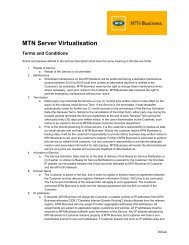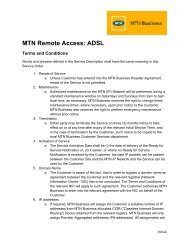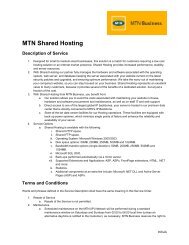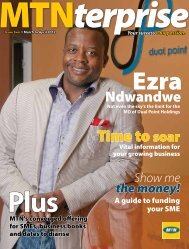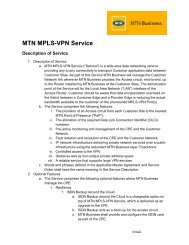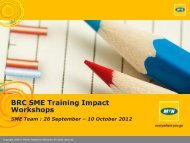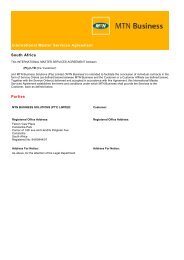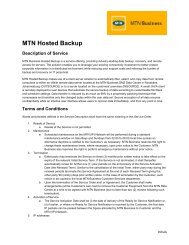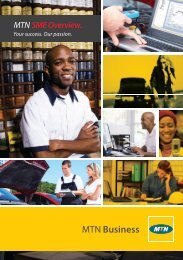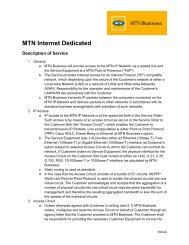SME Issue 3.pdf - MTN Business
SME Issue 3.pdf - MTN Business
SME Issue 3.pdf - MTN Business
You also want an ePaper? Increase the reach of your titles
YUMPU automatically turns print PDFs into web optimized ePapers that Google loves.
exposureGoing social, going vira ldid youknow?Off the beaten tra ckWe asked Neil McCreadie, owner of amultimedia branding company, aboutthe do’s and don’ts of marketing your<strong>SME</strong> via social media. By ANDRé WIESNERWhy are so many businesses going social?Mostly because everyone else is. If you’re not there, you’remissing out. It was optional once to have a social-mediapresence – now it’s a necessity.The major benefits?It’s a way of informing and engaging with customers. It allowsyou to put news out to people who ’like’ you on Facebookor ’follow’ you on Twitter; but it also allows them to tell theirfriends about your message. So it makes news travel virally. Themain question clients ask me is, ’Should I be on social media?’My reply is, ’Who are your customers? Are they going to benefitfrom this?’ If it’s going to benefit them, it’ll benefit you.And the drawbacks?You only get out what you put in, and even then there areno guarantees. Social media won’t benefit all businesses: itdepends on the nature of the business and the style you adopt.It’s about conversation and community, about lettingpeople talk back and not just talking at them. Give theminformation they’ll want, give them reasons to return, andkeep the content updated. The thing is to not only create apresence but to maintain it. Don’t do things in half measures,don’t spam people with junk. It’s also particularly detrimentalif they’re moaning about you and you’re not paying attentionto your social channels. Effectively, you’re ignoring thesepeople – and you’ll get slated even more.Can I do this myself or should I ask for professional help?You can create a profile yourself in minutes, and there areresources all over the Internet to help you make optimal useof social media. Professionals can assist so that your messagesacross print, social and website media are cohesive.What basic know-how should I have about Facebook?A Facebook Profile is for you to interact with friends andfamily; a Facebook Page is for business promotion. Youneed to create the personal profile before you can set up abusiness page.Are there rules against using a Facebook Profile formarketing purposes?There are, and they’re very strict. Rules also apply to FacebookPages, all of which are listed on the website.Should I have a website first?It’s not essential. Some people go social without a website;others have both but let the two operate independently.Ideally, they should work hand in hand, as social channelsare often used as a means of driving traffic to websites.And blogging – what are its advantages?If you’re an expert in your business field and you cansustain a blog, keep it current and build an audience, thenit’s worthwhile. Some people blog about their specialistarea purely because they enjoy writing or interacting withaudiences, but for most the primary aim is to attract potentialcustomers by demonstrating some form of expertise, bygenerating traffic to visit their websites, and by improvingtheir page rankings in search-engine results.It’s all about exposure. The person you’re giving free adviceto might come back to you later if he needs professionalfollow-up. The topics you write about will appear in searchresults and entice people to your site. And the big thingabout blogs is that, because there’s regular content, Googlelikes them and ranks them higher on search-result pages.Is social networking secure? Can people stealmy ideas?If you’re putting them out there, yes. Anybody can see whatyou’re posting, so it’s as secure as content on any website canbe. If it’s public, it’s public. What people go on to do with yourinformation is up to them.Image: Shutterstock.comImage: Shutterstock.comSo you want to start your own business but every time you mention your idea to someone they startlaughing uncontrollably. Take heart – some of today’s most successful businesses started out that way. Andthe people who started them are the ones laughing now… and not just to the bank. By Wendy MaritzStarting a business and creative thinking go hand in hand.Sure, you will eventually need to look at the practicalitiesonce your idea takes off, but often it’s a light bulb momentthat starts it all. An idea that just can’t be ignored.The Bugarian empireIn Karl Eriksen’s case it was a light ‘bug’ moment. A keen artistat school and goldsmith’s apprentice after, Karl has beenpottering around creating things most of his adult life. Oneof his recent projects involved repurposing computer circuitboards and old hard drives to make lamps and clocks. Hiscreations were met with confusion because people didn’tknow exactly what they were for, or, if they did recognisethem, thought they were way too different. ‘I realised I had totry something else with all the microchips I had left over,’ heexplains. ‘And then it hit me… The word “bug” appears a lot inthe English language. Love bug, bed bug, etc. I had a pictureof an end product that involved characters whose namesincorporated the word bug. It took a while to fine-tune, butthe character names just started rolling – Buglo Picasso, BugMarley, Lady Bugga…’ And thus the Computer Bug familywas born.Using computer parts and a few craft supplies, Karl hascreated more than 200 wondrous characters. Initially, saleswere slow, and many people didn’t ‘get’ the concept. As heexplains, ‘My optimism was not shared. But I managed to createa niche market and people started buying them as presents forfriends and family. And they would always come back for more.Christmas time is when most of them find a home,’ he smiles.Through sheer creative genius and originality, he has soldmore than 25 000 of his Computer Bugs to date! The secretto his success, Karl reckons, is the fact that ‘there is a bug foreveryone. It’s an affordable but highly personal gift.’ He’s evenhad orders from companies like Standard Bank, FNB andUnilever, and was a finalist in the South African chapter of theDesign Indaba.For more information, visit countrycraftmarket.org/stall190.html, email karl_eriksen@yahoo.com or call 082 848 8884.Bits and bobsAcross the Atlantic, Bob Page is sitting with some bits andpieces of his own, an incredible 13 million of them. When Bob,an auditor by profession, wanted to start his own businessover 30 years ago, he was told his idea was crazy! At the timeBob owned a part interest in an antique store in Greensboro,North Carolina. A customer asked whether he could helpher find some missing pieces for her china set. Bob obliged.And then something interesting happened. The more peoplelearned of his interest in china and crystal, the more queriesstarting flowing in for him to be on the lookout for particulardinnerware patterns they needed, as well as replacements formissing or broken pieces. Soon he was devoting more andmore time to his hobby, storing the china and crystals in hisattic, and using his bedroom as an office.Bob was refused a loan on the basis that the bank thoughthis idea would never work. Undaunted, Bob persuaded theowner of a commercial building to rent him some retail space.He got word out about his new venture by placing small adsin the newspapers, and after one year of being in business, hisbusiness grossed $150 000. In 2002, sales exceeded $69 million.Nowadays, Bob’s business, named Replacements, housesthe world's largest selection of old and new dinnerware,including china, stoneware, crystal, glassware, silver andcollectibles. The 500 000-squarefootfacilities house anincredible 13 million pieces inmore than 360 000 patterns,some dating back over 100years! Did someone saysomething about crazy?Visit www.replacements.com for a dose of realinspiration!1819



